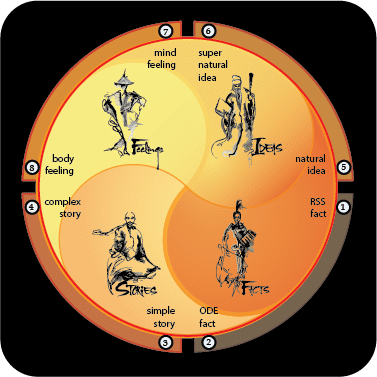Is there a name for being highly sensitive to the sound of dishes clanking?
Sarah, how would you feel if I told you, answering your question holds the key to changing the nature of how all talk therapies are practiced? How? By moving them from things based on “soft” science to things which are in the truest sense, evidence-based. Unfortunately, to properly explain these claims, I’d need far more space than allotted here. What I will offer then is a few starting points from which to explore this topic further.
[1] There are two, and only two, scientifically observable ways to know for sure you have been wounded. Here, by “wounded,” I mean, your mind has been reprogrammed so that
in a specific setting, you suddenly lose your ability to visualize things. The two ways to know this has happened? Seeing someone wince and or flinch. In either case, when you see this happen, it tells you, the screen of this person’s mind has suddenly gone blank. And what makes seeing this evidence scientific is that once this reprogramming has occurred, from then on, these observable responses happen without exception.
[2] What makes the person’s mind suddenly go blank? Reliving a moment in which you were startled. Here, by “startled,” I mean, “being painful surprised in a specific setting when you assumed you were safe.” Without exception, being startled causes a permanent change in the mind. The change? The pattern you experienced in the three-to-five seconds right before the startle will, from then on, cause you to relive the startle. And reliving a startle always causes the person to either wince, or flinch, or both.
[3] Now comes the aspect of being wounded which makes wounds so difficult to heal. You refer to this aspect of being wounded when you say the words, “things like.” You see, the three-to-five second patterns which trigger wounds are “context independent.” By this, I mean, they have almost nothing to do with what we were doing in the original event; the context. Rather, these patterns function like cookie-cutter molds, in that any life experiences which can fit into these molds will re-trigger the startle response. In your case, this means, it doesn’t matter whether
you clank the dishes or whether someone else does the clanking. Nor does it matter whether you literally hear dishes clank or whether you imagine hearing this sound in your mind. Indeed, it also doesn’t matter whether the source of the clanking noise is dishes or bowls or even some objects unrelated to eating. If the clanking noise is the trigger, then you will wince or flinch regardless of the source of this noise.
[4] The good news? Once you become able to witness the three-to-five second pattern without flinching, the wound gets healed. And unlike present beliefs, where “healing” equates to symptom relief, with real healing, there is scientifically observable evidence if it has occurred. The evidence? In your case, Sarah, you would fall in love with hearing that sound. And yes, I’m certain, as of today, you cannot imagine how this could happen. In fact, I’m sure you feel certain it could never happen. The thing is, you could move closer to this healing were you able to imagine a two year old girl who has fallen in love with the sound of two things being banged together. “Love” is why children who discover these things do them over and over again. Once you fall in love with something, you feel as if you cannot get enough of this particular experience. And if you’ve been following this, you may realize, the result of healing wounds IS love.
[5] Now if none of this has made sense to you, please know, this is a normal response. Being startled makes the mind abruptly go blank. So the mind cannot see any of this happen. The thing is, if you’re interested in seeing the science behind my claims, and if you’re willing to put in the effort, my new book explains the science behind these claims AND can show you how to heal this wound forever, meaning, it can help you to fall in love with hearing that sound,
Lastly, realize, giving your reaction a name is a medical red herring. On the one hand, having a name for it can temporarily make you feel hopeful. If it has a name, you’re not the only one who has it. Unfortunately, in the end, knowing this name changes nothing. And in truth, you deserve far more. And that excited, wide-eyed, beautiful little girl inside you deserves to fall in love with that noise.
